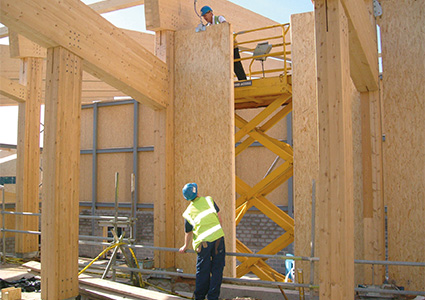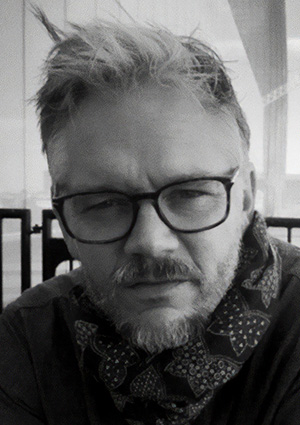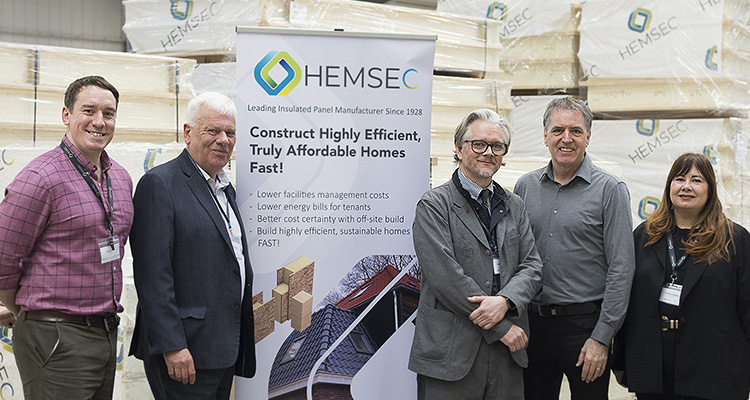Hemsec is reshaping the built environment, together, for a better tomorrow
Proud to be one of the UK’s leading composite insulated panel manufacturers, with over 95 years’ industry experience, Hemsec has played a key role in shaping the use of insulated panels across many sectors.
Everything the company manufactures, either keeps cold air inside a structure or firmly shuts it out. Cyril Hemmings founded the company in 1928 to supply insulated cabinets to an enterprising ice-cream and refrigeration salesman. Today, Hemsec supplies a variety of markets, including providing structural insulated panels (SIPs) to the construction industry.
 “Hemsec is a family-run company and I’m the third generation by marriage,” begins Stephen Painter, Managing Director. “We cut our teeth creating solutions for ice cream storage, using cork back in the day. Reflecting on generational operations, the business has been involved in multiple forms of insulation over the years. Our current factory was built in the 1970s and we’ve been based at this location for over 50 years. Our pedigree and history are based around the UK’s food industry. We create steel structures that store food to preserve and keep it safe. We work with all the major supermarkets, as well as hygienic clean rooms for medical application and food preparation companies; basically, anybody that has a walk-in fridge or freezer in their shop or facility.
“Hemsec is a family-run company and I’m the third generation by marriage,” begins Stephen Painter, Managing Director. “We cut our teeth creating solutions for ice cream storage, using cork back in the day. Reflecting on generational operations, the business has been involved in multiple forms of insulation over the years. Our current factory was built in the 1970s and we’ve been based at this location for over 50 years. Our pedigree and history are based around the UK’s food industry. We create steel structures that store food to preserve and keep it safe. We work with all the major supermarkets, as well as hygienic clean rooms for medical application and food preparation companies; basically, anybody that has a walk-in fridge or freezer in their shop or facility.
“We provide the products; we don’t build them. We used to have an installation arm, but we currently focus on manufacturing and selling. Another offering is SIPs, which are used in construction. This product is very easy and quick to install from a joinery perspective. The envelope of a building is erected, including the floor, the walls and the roof to create an airtight, structurally self-sufficient, and thermally efficient building, which is environmentally and economically beneficial,” Stephen explains.
“We’re on a journey to become B Corp certified,” he elaborates, “and adopt the community’s three pillars, which are people, planet and profit. As a business, we need to be profitable to be sustainable, but we are focused on planet and people. We measure our performance not just financially, but in terms of our environmental impact and how we can reduce our carbon footprint, as well as how we serve our people, whether staff, customers or suppliers. I believe that if we care about those things, profitability to some extent will take care of itself.
“To try and create change in UK housing, we need to build more SIP products. So, we put our money where our mouth is and developed a new facility in 2022. It’s solely a SIP manufacturing facility and is 80,000 square feet, boasting three production presses, including our new press that is completely unique to us, to increase our capability and capacity. To create thermally efficient walls and roofs, we commissioned our bespoke press to manufacture the appropriate thicknesses for UK housing.
“We care enough to know that to a certain extent we are a part of the problem in terms of using petrochemical products in our manufacturing processes. The foam we use is a byproduct of the petrochemical industry. While it helps to save energy, this is a finite resource and I want to know how we can begin to use biochemical alternatives. We shine a light on ourselves and what we do, but we’re constantly striving to see how we can do things differently to make positive change. We have deadlines around our own 2030 carbon positioning, so we’re continuously holding ourselves under the microscope to ensure we can be ethically sound, which I think sets us apart from the competition from an action-based perspective. This isn’t simply an ESG tick-box approach, it’s a fundamental element of our values and vision.
“We’re undertaking product lifecycle analysis to understand our impact, as well as our carbon emissions position to improve our performance, from both a retrospective and future perspective.”
Alongside assessing its environmental impact, Hemsec is also scrutinizing its performance in terms of colleague engagement. “We’re exploring our approach to the

people in our organization. They’re not just staff, they’re stakeholders in the business. We want to be a knowledge hub and we want our staff and our colleagues to be fully on board with everything we’re doing. We strive to be transparent about who we are as an organization and what impact every single colleague can have on the performance of us as a business moving forward. So, we are very purpose driven and have done a lot of work determining our purpose. We exist as an organization to reshape the built environment together and build a better tomorrow. When we recruit now, we recruit from a values-based, purpose-led perspective. I want prospective colleagues to give their best in an organization that cares. Hopefully, that two-way positioning will attract the right people.”
Stephen adds: “Value alignment solidifies engagement in the workplace. It’s important that everyone understands the impact their role can have on the final product. We’re not just helping to create a house, it’s a home. Sometimes ESG can be approached in isolation, but at Hemsec, it’s really ingrained into the culture and our values are reflected in our actions. We’re taking a long-term view and championing sustainability as standard in construction.
“We’re not trying to change the world on our own,” Stephen adds. “We’re all about collaboration. We’re very good at what we do, but we want to extend our reach and have an impact on UK housing, particularly so, considering the current shortage. We have a product and a methodology that can be leveraged to build more affordable housing in this country, and specifically so, around the Liverpool City region, because that’s where we’re based. We’ll bend and mold to make that happen, because we want to be part of the solution.
“2024 is about how we broaden our reach. We’re talking to housing associations and decision makers, trying to cement alliances, collaborations and partnerships. While our process falls under modern methods of construction, it is not a new method, we’ve been operating for nearly 100 years and developing this product for over 15. We’re championing change and greater uptake, and the tide is turning. We believe in ourselves, and we believe in the product,” Stephen concludes. “We’re just growing our network. The next ten-to-20 years are about how we facilitate more houses being built in more modern ways, with an emphasis on developing more sustainable products.”
“By increasing innovation in the construction sector,” adds Stephen, “the UK can position itself as a leader on the global stage. We’re aware of homelessness statistics and we have a solution to bring to the table to address this shortfall. It is a tried and tested method that can make a positive change for the future.”
